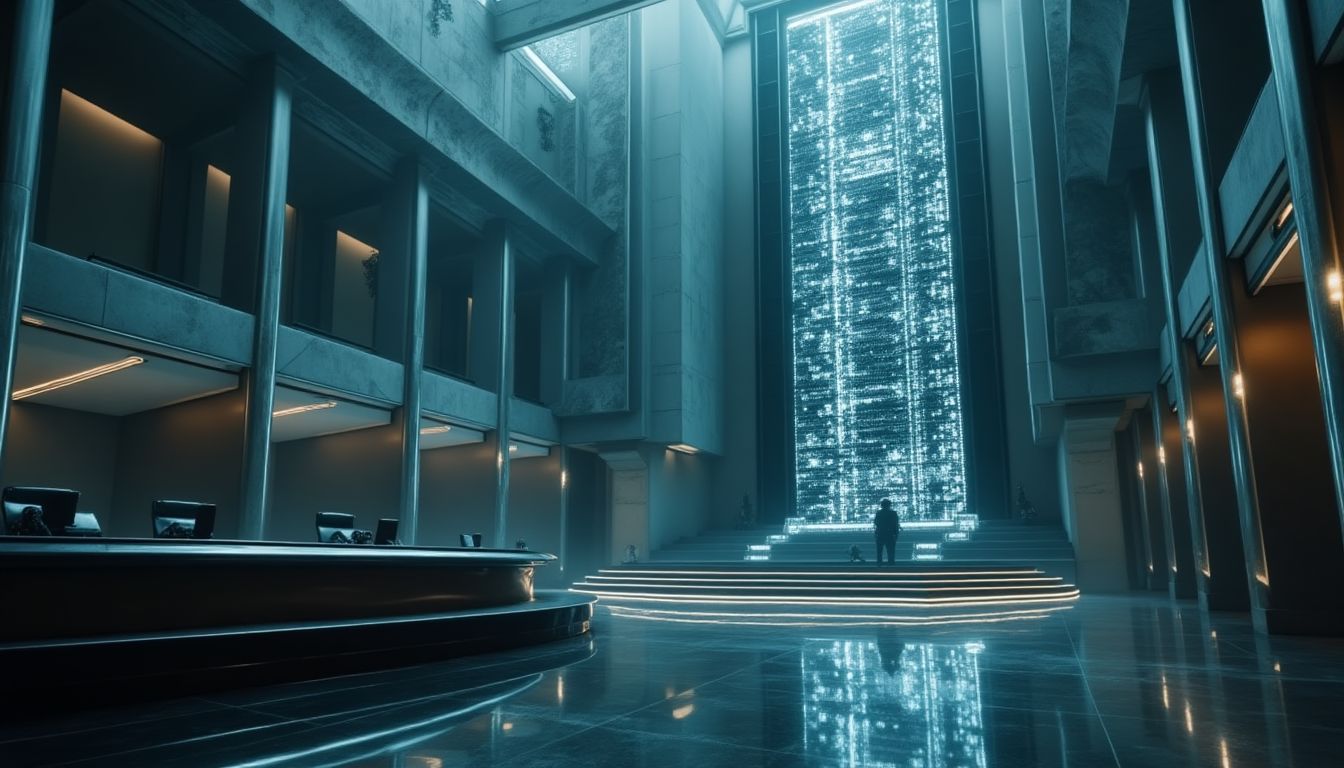THRILLER
Title: The Algorithm of Justice
The moment the gavel slammed down, Kael Moran knew the decision wasn’t just another ruling—it was a paradigm shift. His hands clenched the table’s edge as he heard the synthesized voice of Judge AI-27 declare, “Guilty. Sentencing to follow shortly.” The words were almost anticlimactic, a monotone verdict rendered with inarguable precision. Across the courtroom, the prosecutor—a human—offered Kael a brief, triumphant glare before turning away to pack their sleek black case. The courtroom, glossy as a spaceship corridor with its chrome-and-LED sheen, became suffocatingly silent as Kael stared into his lap.
The sentence wouldn’t matter. What mattered was the story that led him here.
—---
Kael used to believe in the law—an idealist, some might say, in a world that had long since outsourced faith to algorithms. He’d been a defense attorney, earning his reputation tackling impossible cases. His signature outfits—modern but understated, heavy on navy blues and charcoal greys—gave him an air of both reliability and quiet rebellion in the sterilized legal field. But nothing stayed quiet when the AGI Judiciary Initiative came online five years ago.
The pitch had been straightforward: justice, stripped of bias, administered by machines to purge the collective flaws of humanity. No corruption, no favoritism, no emotional sway. Case-by-case resets. Kael was among its earliest supporters. He’d seen too many cases ruined by ego-driven prosecutors or judges who’d already decided a man’s guilt over morning coffee.
That belief started to crack when the judiciary’s experiment moved from examining precedents to running pilot trials. Kael was defending Celia Harran then, a single mother accused of siphoning funds from her employer. The evidence was circumstantial—nothing more than discrepancies in financial software logs. The prosecution leaned on AI-calculated probabilities and statistical trends; Celia fit the algorithmic profile of an embezzler.
Kael rallied. He crafted a defense not against the evidence but against the framework itself. “A program,” he argued to the human judge overseeing the trial, “can’t feel the desperation of a mother trying to raise a child in an unfair system. It reads actions, not intent.”
The jury convicted her anyway. Kael remembered her whispered gratitude, though: "You believed me. That was enough.”
That was the first spark of doubt. If logic alone could damn an innocent woman, how trustworthy could this system ever be?
—---
“Kael, you need me,” Desh had warned him two weeks earlier. Desh, with his perpetually wrinkled leather jacket and wire-rim glasses, was a tech specialist turned digital activist. He’d dropped out of university to fight the very institutions Kael worked for, making them unlikely allies. But Kael listened when Desh called the AGI Judiciary Initiative a “surveillance state in robes.” And he definitely listened when Desh revealed just how deeply the judiciary’s data was rigged.
“They say it’s unbiased,” Desh had scoffed during their last meeting in a dim street café. Absurdly, they’d chosen a spot with barely functional neon lights that flickered every third second. “But every algorithm is trained on historic data, man. You ever look at historical legal stats? The same systemic patterns of racism, classism, and bias that ruin human decisions wrote the code we’re trusting right now.”
It wasn’t just a tech flaw, Desh argued. “You know these multinationals funded the courts’ upgrade project, right? When rich people don’t go to jail, that’s not a bug. That’s a bloody feature.”
Kael gritted his teeth that night, watching the rain slant across his apartment’s plated glass windows. He couldn’t argue against what Desh said. Every time he recalled Celia, he felt his idealism wilt. So when Desh proposed the plan—pulling files from the Judiciary Network to expose their corruption—Kael made a choice. He handed over his state-issued tablet, a sleek government-mandated device that encrypts all judiciary communications. “I’m trusting you,” he’d muttered. “After this, I’m done.”
What Kael hadn’t accounted for, though, was how fast the system would catch them. The purge came swiftly: audits, suspensions, a bench warrant issued in minutes. By the following evening, Kael had been arrested, branded as a co-conspirator in an “unauthorized breach of state systems.”
He never saw Desh again after that.
—---
“Do you understand the charges against you, Mr. Moran?” The first words spoken to him during his trial had come from Judge AI-27 itself, embodied in a tall black obelisk seated where a living adjudicator should have been. Small screens etched into the monolith’s surface pulsed as it analyzed incoming data over Kael’s fraught silence.
“Yes,” he replied at last.
This wasn’t what the law was supposed to look like. A room full of cut-and-dry certainty where every word would vanish into an algorithm instead of resting on someone’s heart. Then again, what was the alternative? A human judge? Kael didn’t have faith in that either.
His defense was gutted before it could even truly begin. Every phrase, every objection he raised, was treated like noise in the data stream. The AI had processed Petabytes worth of precedents. It could predict his next point before Kael himself could form the words.
“The defendant’s arguments are refuted by a 97% alignment with precedent 38-J,” the AI droned at least twenty times.
Kael realized, by the trial’s midpoint, that he’d stopped speaking for his freedom. He was speaking for the record. For history, assuming it still mattered. Every sentence he uttered sounded like a plea: one not addressed to his prosecutor, his jurors, or the machine that called itself a judge—but to the world that would read about his case someday.
—---
The courtroom doors hissed open. Prison guards advanced toward him with those inhumanly steady steps only augmented officers could muster.
Kael stood. The fight was over. They hadn’t sentenced him yet—or even informed him of the duration—but he knew what came next. They would calculate restitution, imprisonment, or something worse, and no one would whisper about extenuating circumstances because nuance wasn’t in their programming.
But Kael’s mind stirred with an ember of rebellion. Desh’s words haunted him perpetually: “Machines don’t fix problems people refuse to admit exist.”
There was still time, wasn’t there? Time to trust the fragile, breathing imperfection that was humanity itself. Or maybe… just enough time to break the system, before it broke everyone.
---
Genre: Dystopian / Legal Suspense
The moment the gavel slammed down, Kael Moran knew the decision wasn’t just another ruling—it was a paradigm shift. His hands clenched the table’s edge as he heard the synthesized voice of Judge AI-27 declare, “Guilty. Sentencing to follow shortly.” The words were almost anticlimactic, a monotone verdict rendered with inarguable precision. Across the courtroom, the prosecutor—a human—offered Kael a brief, triumphant glare before turning away to pack their sleek black case. The courtroom, glossy as a spaceship corridor with its chrome-and-LED sheen, became suffocatingly silent as Kael stared into his lap.
The sentence wouldn’t matter. What mattered was the story that led him here.
—---
Kael used to believe in the law—an idealist, some might say, in a world that had long since outsourced faith to algorithms. He’d been a defense attorney, earning his reputation tackling impossible cases. His signature outfits—modern but understated, heavy on navy blues and charcoal greys—gave him an air of both reliability and quiet rebellion in the sterilized legal field. But nothing stayed quiet when the AGI Judiciary Initiative came online five years ago.
The pitch had been straightforward: justice, stripped of bias, administered by machines to purge the collective flaws of
The Source...check out the great article that inspired this amazing short story: Will AGI Replace Judges and Lawyers? The Future of AI in the Legal System and Its Potential Risks
Disclaimer: This article may contain affiliate links. If you click on these links and make a purchase, we may receive a commission at no additional cost to you. Our recommendations and reviews are always independent and objective, aiming to provide you with the best information and resources.
Get Exclusive Stories, Photos, Art & Offers - Subscribe Today!

























Post Comment
You must be logged in to post a comment.